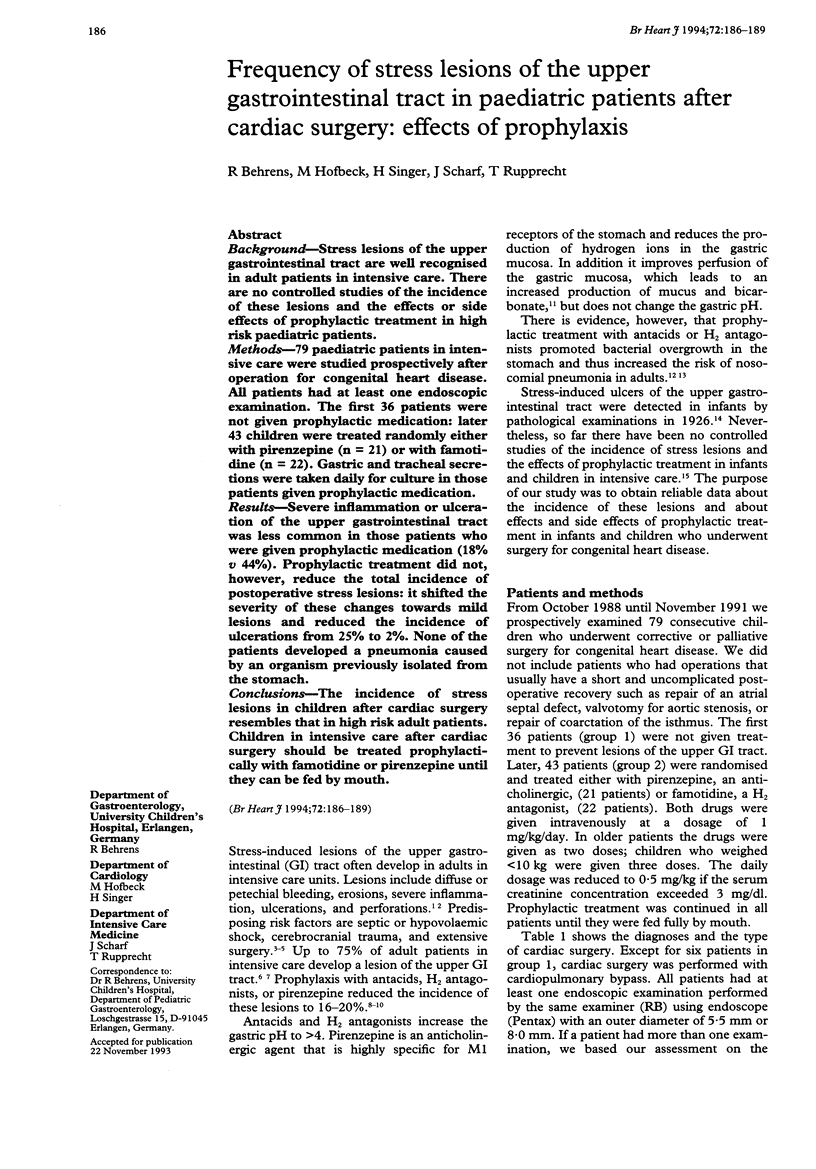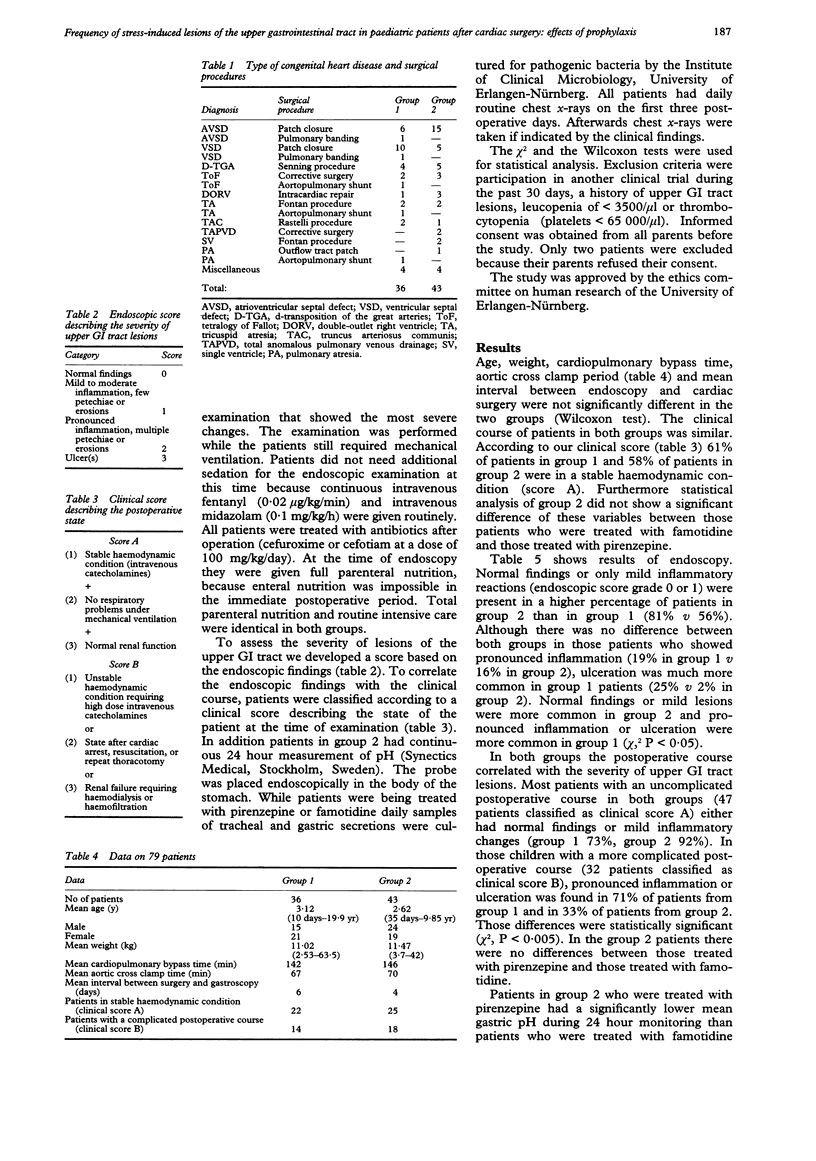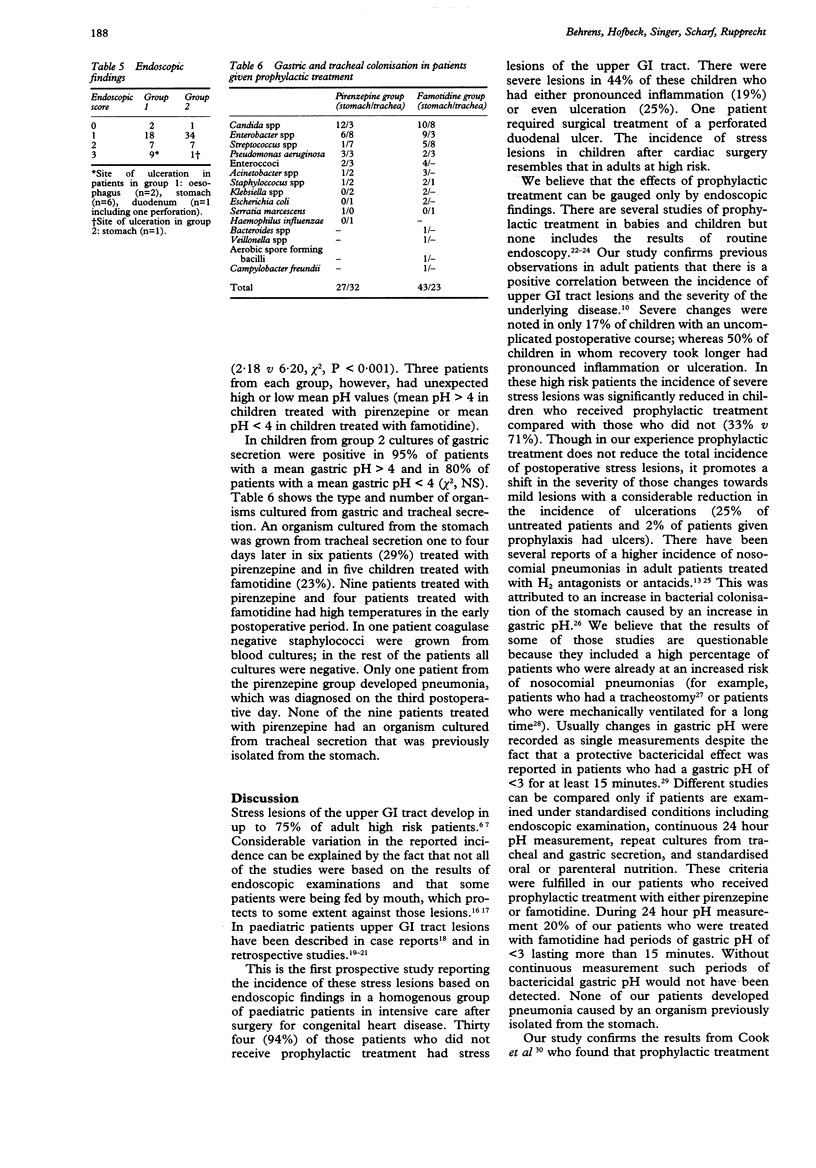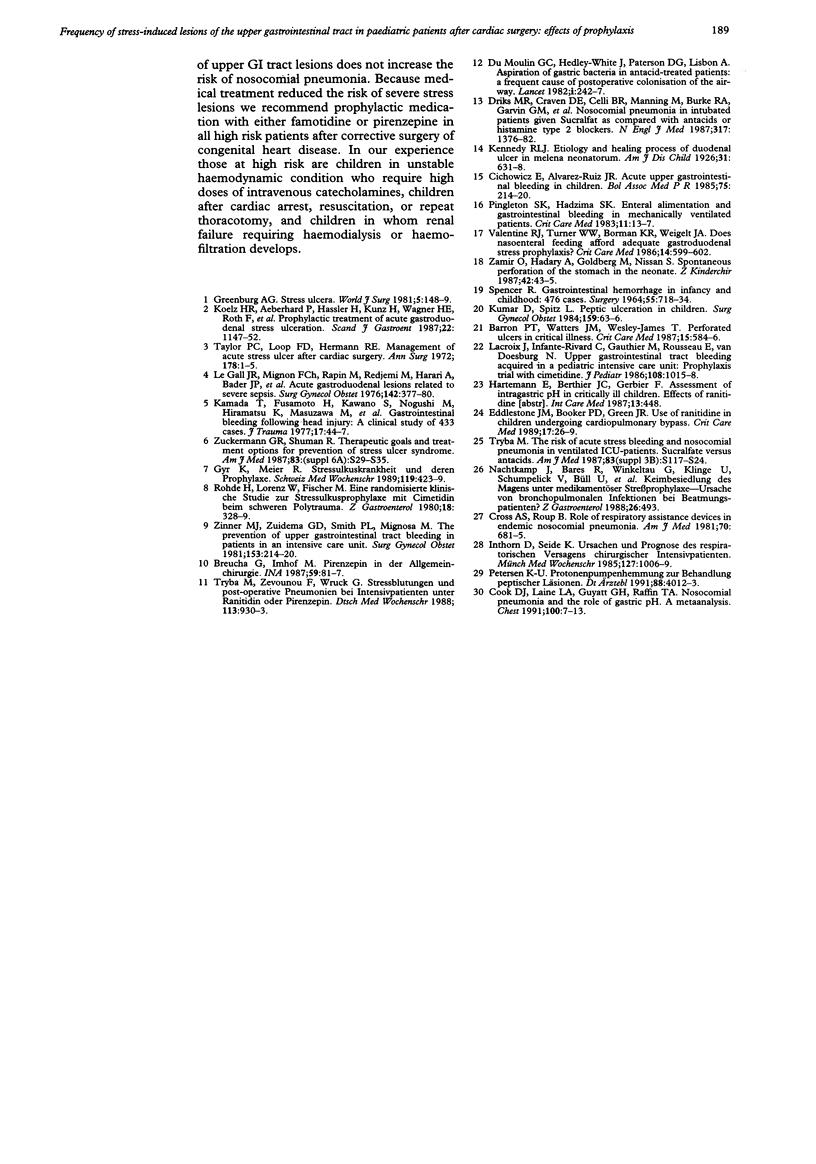Abstract
BACKGROUND--Stress lesions of the upper gastrointestinal tract are well recognised in adult patients in intensive care. There are no controlled studies of the incidence of these lesions and the effects or side effects of prophylactic treatment in high risk paediatric patients. METHODS--79 paediatric patients in intensive care were studied prospectively after operation for congenital heart disease. All patients had at least one endoscopic examination. The first 36 patients were not given prophylactic medication: later 43 children were treated randomly either with pirenzepine (n = 21) or with famotidine (n = 22). Gastric and tracheal secretions were taken daily for culture in those patients given prophylactic medication. RESULTS--Severe inflammation or ulceration of the upper gastrointestinal tract was less common in those patients who were given prophylactic medication (18% v 44%). Prophylactic treatment did not, however, reduce the total incidence of postoperative stress lesions: it shifted the severity of these changes towards mild lesions and reduced the incidence of ulcerations from 25% to 2%. None of the patients developed a pneumonia caused by an organism previously isolated from the stomach. CONCLUSIONS--The incidence of stress lesions in children after cardiac surgery resembles that in high risk adult patients. Children in intensive care after cardiac surgery should be treated prophylactically with famotidine or pirenzepine until they can be fed by mouth.
Full text
PDF



Selected References
These references are in PubMed. This may not be the complete list of references from this article.
- Barron P. T., Watters J. M., Wesley-James T. Perforated ulcers in critical illness. Crit Care Med. 1987 Jun;15(6):584–586. doi: 10.1097/00003246-198706000-00008. [DOI] [PubMed] [Google Scholar]
- Cichowicz E., Alvarez-Ruiz J. R. Acute upper gastrointestinal bleeding in children. Bol Asoc Med P R. 1983 May;75(5):214–220. [PubMed] [Google Scholar]
- Cook D. J., Laine L. A., Guyatt G. H., Raffin T. A. Nosocomial pneumonia and the role of gastric pH. A meta-analysis. Chest. 1991 Jul;100(1):7–13. doi: 10.1378/chest.100.1.7. [DOI] [PubMed] [Google Scholar]
- Cross A. S., Roup B. Role of respiratory assistance devices in endemic nosocomial pneumonia. Am J Med. 1981 Mar;70(3):681–685. doi: 10.1016/0002-9343(81)90596-9. [DOI] [PubMed] [Google Scholar]
- Driks M. R., Craven D. E., Celli B. R., Manning M., Burke R. A., Garvin G. M., Kunches L. M., Farber H. W., Wedel S. A., McCabe W. R. Nosocomial pneumonia in intubated patients given sucralfate as compared with antacids or histamine type 2 blockers. The role of gastric colonization. N Engl J Med. 1987 Nov 26;317(22):1376–1382. doi: 10.1056/NEJM198711263172204. [DOI] [PubMed] [Google Scholar]
- Eddleston J. M., Booker P. D., Green J. R. Use of ranitidine in children undergoing cardiopulmonary bypass. Crit Care Med. 1989 Jan;17(1):26–29. doi: 10.1097/00003246-198901000-00007. [DOI] [PubMed] [Google Scholar]
- Gyr K., Meier R. Stressulkuskrankheit und deren Prophylaxe. Aktuelle Analyse. Schweiz Med Wochenschr. 1989 Apr 5;119(13-14):423–429. [PubMed] [Google Scholar]
- Kamada T., Fusamoto H., Kawano S., Noguchi M., Hiramatsu K. Gastrointestinal bleeding following head injury: a clinical study of 433 cases. J Trauma. 1977 Jan;17(1):44–47. [PubMed] [Google Scholar]
- Koelz H. R., Aeberhard P., Hassler H., Kunz H., Wagner H. E., Roth F., Halter F. Prophylactic treatment of acute gastroduodenal stress ulceration. Low-dose antacid treatment without and with additional ranitidine. Scand J Gastroenterol. 1987 Nov;22(9):1147–1152. doi: 10.3109/00365528708991972. [DOI] [PubMed] [Google Scholar]
- Kumar D., Spitz L. Peptic ulceration in children. Surg Gynecol Obstet. 1984 Jul;159(1):63–66. [PubMed] [Google Scholar]
- Lacroix J., Infante-Rivard C., Gauthier M., Rousseau E., van Doesburg N. Upper gastrointestinal tract bleeding acquired in a pediatric intensive care unit: prophylaxis trial with cimetidine. J Pediatr. 1986 Jun;108(6):1015–1018. doi: 10.1016/s0022-3476(86)80952-0. [DOI] [PubMed] [Google Scholar]
- Le Gall J. R., Mignon F. C., Rapin M., Redjemi M., Harari A., Bader J. P., Soussy C. J. Acute gastroduodenal lesions related to severe sepsis. Surg Gynecol Obstet. 1976 Mar;142(3):377–380. [PubMed] [Google Scholar]
- Moskowitz R. W. Primary osteoarthritis: epidemiology, clinical aspects, and general management. Am J Med. 1987 Nov 20;83(5A):5–10. doi: 10.1016/0002-9343(87)90844-8. [DOI] [PubMed] [Google Scholar]
- Pingleton S. K., Hadzima S. K. Enteral alimentation and gastrointestinal bleeding in mechanically ventilated patients. Crit Care Med. 1983 Jan;11(1):13–16. doi: 10.1097/00003246-198301000-00005. [DOI] [PubMed] [Google Scholar]
- Rohde H., Lorenz W., Fischer M. Eine randomisierte klinische Studie zur Stressulkusprophylaxe mit Cimetidin beim schweren Polytrauma. Z Gastroenterol. 1980 Jun;18(6):328–329. [PubMed] [Google Scholar]
- SPENCER R. GASTROINTESTINAL HEMORRHAGE IN INFANCY AND CHILDHOOD: 476 CASES. Surgery. 1964 May;55:718–734. [PubMed] [Google Scholar]
- Taylor P. C., Loop F. D., Hermann R. E. Management of acute stress ulcer after cardiac surgery. Ann Surg. 1973 Jul;178(1):1–5. doi: 10.1097/00000658-197307000-00001. [DOI] [PMC free article] [PubMed] [Google Scholar]
- Tryba M., Zevounou F., Wruck G. Stressblutungen und postoperative Pneumonien bei Intensivpatienten unter Ranitidin oder Pirenzepin. Dtsch Med Wochenschr. 1988 Jun 10;113(23):930–936. doi: 10.1055/s-2008-1067744. [DOI] [PubMed] [Google Scholar]
- Valentine R. J., Turner W. W., Jr, Borman K. R., Weigelt J. A. Does nasoenteral feeding afford adequate gastroduodenal stress prophylaxis? Crit Care Med. 1986 Jul;14(7):599–601. doi: 10.1097/00003246-198607000-00001. [DOI] [PubMed] [Google Scholar]
- Zamir O., Hadary A., Goldberg M., Nissan S. Spontaneous perforation of the stomach in the neonate. Z Kinderchir. 1987 Feb;42(1):43–45. doi: 10.1055/s-2008-1075552. [DOI] [PubMed] [Google Scholar]
- Zinner M. J., Zuidema G. D., Smith P[L, Mignosa M. The prevention of upper gastrointestinal tract bleeding in patients in an intensive care unit. Surg Gynecol Obstet. 1981 Aug;153(2):214–220. [PubMed] [Google Scholar]
- du Moulin G. C., Paterson D. G., Hedley-Whyte J., Lisbon A. Aspiration of gastric bacteria in antacid-treated patients: a frequent cause of postoperative colonisation of the airway. Lancet. 1982 Jan 30;1(8266):242–245. doi: 10.1016/s0140-6736(82)90974-6. [DOI] [PubMed] [Google Scholar]


